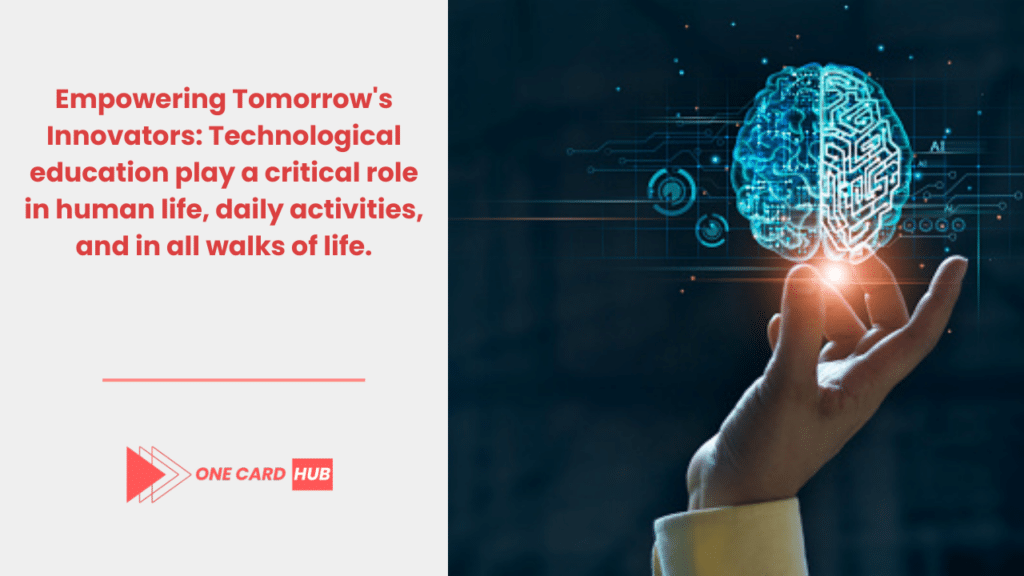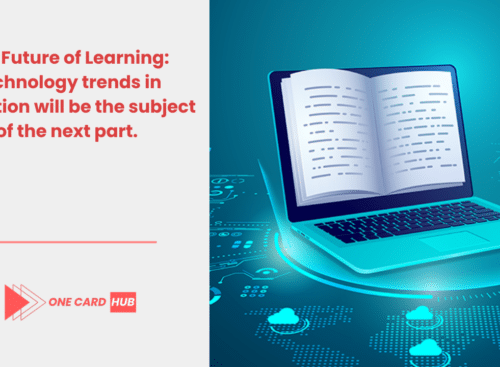
Empowering Tomorrow's Innovators: Technological education play a critical role in human life, daily activities, and in all walks of life.

Indeed, technology, which is cutting a path on all grounds of society, calls for no doubt about the significance of IT training. It stands as a foundation for the training of the upcoming generation of innovators, thinkers, and nerve- center people who will be able to weather the storms of the digital era. The deeper we dig into the steam tech education, more obvious it is not even a matter of teaching technical skills—it is the creation of an innovation, problem-solving, and ongoing learning environment.
Establishing a Sustainable Framework for Critical Thinking and Problem-Solving.
No, technology education does not only include learning to program in a coding language or mastering some particular software. It is about creation of knowledge depth and in the process showing how technology can be used for solving actual world problems. Its about the creation of an aware society and also ensuring true understanding of how it works. By providing a platform where students can receive such training, they will be able to assess their problems logically and get a quick solution to them creatively rather than giving up.
Bridging the Digital Divide
The issue of tech education is paramount in the context of the digital divide—the gap between people who live with technology on a daily basis and people who stay away from them. We can achieve this goal if everyone has a chance to learn tech by its making accessible to all. This implies the world will be safe since everyone will participate and also benefit form technological advancements. This inclusivity is a key component of innovation, as it integrates people from various communities and societies, with a purpose of meeting their needs.
Vocational education should concentrate on learning for a lifetime and adapting oneself, to encounter the new challenges and perseverance the learners may face in their future
The rate of change that happens within the technology industry is unseen in the history of human beings: that what is new today becomes obsolete tomorrow when a new technology gains more popularity. Learning tech skills to a large extent, contributes to the finding realization of the significance of endless learning, equipping people with adaptability and in the long run to shine in their fields. Adaptation hence should be the core attribute of every student because ultimately there is no stability in this volatile environment.
Fostering Interdisciplinary Collaboration
It is increasingly common to find that the intricate problems of today can't be handled efficiently without inter disciplinary solution. Such a study for technology exposes the graduates to collaborate cross disciplines which result in students applying technology to all fields. In this interdisciplinary frame of reference, it becomes possible to generate answers that consider various dimensions together with the understanding of the problem.
The Future of employment has become a subject of wide debate and concern.
The change in AI and automation is certain. Tech education, therefore, makes people prepared for these fast-grown work environment. Teaching students employable skills in emergence technology, alongside soft skills such as communication and teamwork, will empower the workforce to adapt to new types of jobs when technology creates them in the future. The influence of tech education on tomorrow's leaders is probably of tremendous significance than just pure mathematics and science. The fundamental thinking skills such as critical thinking, inclusiveness, lifelong learning, collaboration across the disciplines, and the future of work readiness can be nurtured in technology education, which carries the torch and unveils the potential in a learner to contribute significantly towards innovation in technology. As we gaze to the future in the frame of tech education, it is much more than the increase in individual talents; it is as wearing the mantle of society's advancement.
Nurturing Ethical Technologists
In this age where technology”s reach and influence on the social sphere have been most powerful and ubiquitous, tech education has an significant role to play when it comes to breeding ethically sound and responsible technologists. By effecting ethics, privacy, and security education in technology, we shall be better positioned to teach the next set of innovators the right standards on which they have to base their decisions which are in favor of society. Knowing the set of ethical considerations around technology, for example, AI bias and data privacy issues, endows students with tools to arrive at inventions that are practical, responsible, and fair.
Im Lancering wiedere von Harvesting environmental consciousness through Green Tech
Besides this, tech education also helps in developing values for environmental conservation that are mixed with educational principles governing green technologies and sustainability into the curriculum. Awareness of the environmentally damaging effect of technology like e-waste and energy consumption, studies that teach the use of technology to solve problems and the green tech space. These will provide the skills of the students to contribute to the green tech industry. This has shown to be cohesive with the purpose of which is to enable design of green technologies that can support a green future.
Enhancing Global Competitiveness
The generation of technological education which is strong enough is the main requirement for the development of a country's ability to compete on the global market. Through cultivating an educated workforce that is well-versed in the cutting-edge technologies, nations will be able to create an innovating environment, draw in foreign direct investments, as well as hold an upper hand as against other economies in a global marketplace. Besides, tech education is not only a tool to prepare young people to become the workforce, but it also does contribute to the appearance of new industries and the development of current ones, making the national economy almost consolidated and helping to create jobs.
Establishing Online Platforms and Resources to Maximize Accessible Cybersecurity Education
One of the most salient effects of tech education platforms is that online education reduces the accessibility problem in education. As a result of this, tech education is now accessible to both the socially marginalized and remote areas. And these from MOOCs (Massive Open Online Courses) to coding bootcamps and online tutorials offer learners all over the world the chance to built up tech skills each time they are needed. The egalitarianization of tech education acts as a key driver which bridges the digital divide and gives anyone, who finds themselves with Internet connection, an opportunity to be part of the high-tech generation.
Preparing for Interconnected Challenges
Beyond the scope of old-fashioned solutions, the cross-sectioning issues of the present-day require creative approaches that cut across traditional fronts. It allows students
to explore tech issues from multiple dimensions simultaneously using computer technology as one of the many tools that are available currently. It is also important to develop a holistic approach to make the world a better place, and manifest it in such challenges as environmental pollution, health challenges, and social issues. Whether the future of innovation rings the alarm for or endorses technology education shall largely depend on the quality and coverage of tech education. Tech education that produces youth generations who are ethical, environmentally conscious and globally competitive tech professionals remains the base upon which the future-oriented technology will continue to remain responsible change agent. Not only are we giving technological expertise to the generation of innovators that will carve out tomorrow’s future, but we are also c You've successfully brainstormed a list of attention-getting opening statements. It's now time for some serious research!
Integrating Real-World Problem Solving
The tech education should take into account more practical, on one hand, project based learning which will contribute to the problem solutions. Students can be helped to focus on practice sessions with practical projects that are designed to resolve the problem and enhance communication with the rest of the team when technology effects are articulated. Collaborations among education institutes and business can be in the form of on-the-job experiences and mentorship to give students an understanding of the cutting-edge job requirements within the tech area.
Emphasizing Soft Skills Development
Along with hard skills, involving the development of soft skills will include critical thinking, innovativeness, collaboration, and communication which are all pivotal in tech education. The skills that define these innovators help them work well within a team or transactionally in a complex environment and present their inputs with authority. These skill sets are integrated into tech curriculum as they communicate the fact that the tech industry requires a more complete set of skills, and for leadership
positions.
Promote Cultural of Continuous Learning
Since the ever-accelerating technology paces do entail production of a culture of continuous learning among tech education, such culture of learning should be obtained. We emphasize all types of learning activities, not just schooling but also other informal activities like hackathons, workshops and online courses that make thinking more curious and lead to personal knowledge beyond classroom. A learner's ability to develop learning for life framework skills guarantees ongoing flexibility and capability to remain creative and offer innovation to the public all through their career.
Supporting Diversity and Inclusion
To keep innovation transitioning to the tech education field, diversity and inclusion should be of utmost importance. A cohort composed of various students brings alternative looks, concepts, as well as solutions that shape the diversity of the ideas, thereby stimulating creativity and innovation. Initiatives for creating the Tech literacy enhancement among the under-repasented groups which include women, minorities, and those who where born poor should be prioritized. Promoting diversity and promoting diversity while creating an environment where all students are accepted and supported is the key not only to fostering the motivation in themselves but that of tomorrow's pioneers.
Taking Advantage of the Provided Technologies in Educaton
Now, the impact of technology progress on education progressive movement cannot be underestimated especially. The list of technological game changers is rather long: from AI-based personalized learning platforms to VR an AR learning simulators. The modern tech has great powers to make learning content more enriching. By adding these innovations into the way we learn and teach, institutions can provide students with more experiential, effective and accessible understanding, the one which will make them authors of the very same technology upgrades in the future. The tech education exposing innovators of the future to today’s innovation is surely an issue that require holistic solution. The solution then lies in a focus on the problem-solving in real life, the learning process with the soft skills development, continuous learning, the diversity, and the inclusion as well as the utilization of emerging technologies in order to create a dynamic and inclusive tech education ecosystem so that a single education will be for everyone. This ecosystem will avail students with the technical competencies that are indispensable in their pursuit of being successful and also impart them the futuristic mindset required to negotiate and shape the future. Being now at the forefront, collective efforts and combined activity of educationists, industry leaders, policymakers and communities is crucial in the implementation of the plan. It is where tech education could actually become the main force of innovation and solution to advance society.
FAQ: Tomorrow’s Innovution Literacy Can Be Achieved Through Transforming Teach into Tech
1: What is the role and relevance of authentic problem solving in the context of technical processing education?
The best reason why students need to practice problem solving in real life is that it creates an environment where they can apply the already existing theory into practical situations like critical thinking, creativity and innovation. Therefore, students have their knowledge illustrated as well as illuminated as they wish. It trains students for the complexity of the tech industry and fosters solution-oriented designs that reflect the possible application of the end-user.
The best reason why students need to practice problem solving in real life is that it creates an environment where they can apply the already existing theory into practical situations like critical thinking, creativity and innovation. Therefore, students have their knowledge illustrated as well as illuminated as they wish. It trains students for the complexity of the tech industry and fosters solution-oriented designs that reflect the possible application of the end-user.
2: How the education in technology can achieve the integration of soft skills learning?
Tech education can bridge up the soft skills gap by putting forward collaborative projects, leadership initiatives, presentations and communication exercises into the academic process. Procedures as well can be organized to provide festivals and classes, wherein enrollment skills along with technical skills can be emphasized.
Tech education can bridge up the soft skills gap by putting forward collaborative projects, leadership initiatives, presentations and communication exercises into the academic process. Procedures as well can be organized to provide festivals and classes, wherein enrollment skills along with technical skills can be emphasized.
3: Why should organizations in tech take learning culture as the essence of their businesses?
The pace at which technologies and approaches roll out, with the rise of one while the other becomes obsolete is so quick. Introducing a culture of lifelong learning guarantees that personalities know how to maintain the necessary adaptability, do not fall behind technological development and always create a fresh contribution to the innovations of their employment.
The pace at which technologies and approaches roll out, with the rise of one while the other becomes obsolete is so quick. Introducing a culture of lifelong learning guarantees that personalities know how to maintain the necessary adaptability, do not fall behind technological development and always create a fresh contribution to the innovations of their employment.
4: What role does variation and the belonging of people play in technical education?
Diference and nofication are the drivers of technology technology that brings a wide range of view points of which are vital to innovation. Interventions to provide better access and build a safe atmosphere for populations saliently lowering down will boost the world’s creativity and trigger much equality and preparedness in technology.
Diference and nofication are the drivers of technology technology that brings a wide range of view points of which are vital to innovation. Interventions to provide better access and build a safe atmosphere for populations saliently lowering down will boost the world’s creativity and trigger much equality and preparedness in technology.
5: When it comes to the link between emerging technologies and the tech education what role can they play in this?
The technologies which are coming up like AI and VR are a game changer, in education they can individualize the learners amongst the learners making it more engaging and accessible. They back up both the immersive method of education and the learner-centred approach which helps understand complex concepts well. Therefore, the students are ready for technological advancements.
The technologies which are coming up like AI and VR are a game changer, in education they can individualize the learners amongst the learners making it more engaging and accessible. They back up both the immersive method of education and the learner-centred approach which helps understand complex concepts well. Therefore, the students are ready for technological advancements.
6: Provide the setting for different perspectives: the obstacles involved in study of real-world problem solving application into computer education?
There are three issues that are usually faced by universities: matching real life problems which are relevant and current, access to necessary resources especially technology and setting up of network with industries for authentic learning put into practice. By simultaneously considering theory discussion with practice sessions, planning curriculum becomes a strategic act as well.
There are three issues that are usually faced by universities: matching real life problems which are relevant and current, access to necessary resources especially technology and setting up of network with industries for authentic learning put into practice. By simultaneously considering theory discussion with practice sessions, planning curriculum becomes a strategic act as well.
7: What kind of encouragement could the school system provide for continued self-development for data management learners?
Educational institutions can promote life-long learning by providing a variety of learning tracks, online tools and courses, options to work on research and innovation projects as well as making the participation of specific communities only possible.
Educational institutions can promote life-long learning by providing a variety of learning tracks, online tools and courses, options to work on research and innovation projects as well as making the participation of specific communities only possible.
8: Strategies of how to entry the diversity and inclusion in tech education, what should be taken into account?
Efforts consist of providing scholarships to underrepresented groups, mentorship and outreach that reaches out to especially vulnerable populations, curricula which is sufficiently inclusive of all students' needs, and an environment where everybody is welcomed and valued.
Efforts consist of providing scholarships to underrepresented groups, mentorship and outreach that reaches out to especially vulnerable populations, curricula which is sufficiently inclusive of all students' needs, and an environment where everybody is welcomed and valued.
9: May you please give me an example of what VR and AR is doing in the area of tech education?
VR and AR become very significant in the context of simulating environments in training purposes. The examples of such training is the employ of VR in healthcare education for surgical simulations and digital labs in engineering. They may also provide immersive education in history or science with real life simulations through turning abstract knowledge into understandable content.
VR and AR become very significant in the context of simulating environments in training purposes. The examples of such training is the employ of VR in healthcare education for surgical simulations and digital labs in engineering. They may also provide immersive education in history or science with real life simulations through turning abstract knowledge into understandable content.
10: Why is tech education important for our society? As technology continues to advance, tech education plays an increasingly significant role in society, where its influence is not limited to students who pursue tech careers.
Tech training has a powerful effect on society in that it builds a manpower version proficient enough to lead and solve complex problems in business areas and also drive the economy. Furthermore, technology in its social dimension also helps in tackling societal problems through the use of technology making healthcare better, education smarter, and environmentally sustainable.
Tech training has a powerful effect on society in that it builds a manpower version proficient enough to lead and solve complex problems in business areas and also drive the economy. Furthermore, technology in its social dimension also helps in tackling societal problems through the use of technology making healthcare better, education smarter, and environmentally sustainable.






Related posts